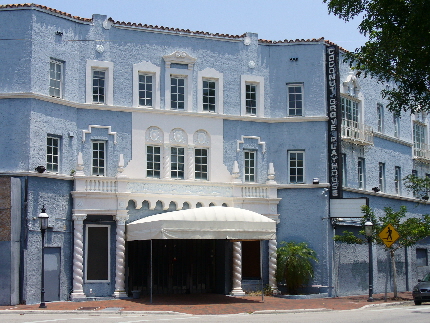 By Bill Hirschman
By Bill Hirschman
Miami-Dade County is “prepared” to sue the City of Miami in order to proceed with its plan to resurrect the Coconut Grove Playhouse, said a county official spearheading the project.
The project was dealt a potentially crippling blow last week by City Mayor Francis Suarez’s vetoing his city commission’s siding with the county.
“We’re prepared” to sue the city if no agreement can be reached or if the city commission fails to override the veto Thursday, said Michael Spring, director of the Department of Cultural Affairs, at the opening night of a GableStage production Saturday.
GableStage Producing Artistic Director Joseph Adler, whose company would occupy and manage the facility, told the audience, “We will prevail. We are going to (fight) as long as it takes. It’s a long arduous road and we’re going to get there.”
At stake is a joint proposal by Miami-Dade County, Florida International University and the GableStage regional theater. The plan would maintain the iconic front exterior of the 1926 structure but tear down the rest of the deteriorating former movie house. It would be replaced with a modern structure including a 300-seat theater at 3500 Main Highway in Coral Gables. FIU would hold theater classes inside.
That $23.6 million plan financed mostly with earmarked bond issues proceeds is ready to go out for bids pending building permits. But a less advanced competing proposal favored by historical preservationists and a wealthy arts advocate suggests restoring the entire building, featuring a 700-seat theater and a possible price tag of $46 million
The nationally-known Playhouse has been closed since 2006 – its 50th anniversary season — when an estimated $4 million in debts caused its non-profit board to shutter operations. But arts and county officials led by Spring had been striving for years before that to preserve some kind of theater operation on the site.
Prior to any lawsuit, the county has one more chance. The city commission meets at 9 a.m. Thursday to decide whether it will override the mayor’s veto. That requires a minimum of four votes from the five commissioners. A commission vote on May 9 ended 3-2 in favor of the county, so county officials hope to persuade at least one commissioner to back their plan.
Otherwise, the county plans to proceed with a legal challenge to the veto. It would center on the dizzyingly complex series of approvals and rejections in various committee hearings and commission votes.
A key incident in contention occurred when the city’s historical preservation board, which gave its blessing earlier, reversed itself and recommended the county project be rejected. On May 9, the city commission upheld the county’s formal request that the recommendation be overruled.
But on May 17, Suarez, who does not vote on the commission, vetoed that action. He cited several technical and legal arguments, but he underscored that his real concern was to avoid razing a historic landmark.
One scenario he suggested was work on an adjacent parking garage would begin immediately. A 200-seat theater would be built first behind the current building. As soon as possible, the decade-long deterioration of the building’s interior would be proactively halted and efforts made to preserve the remaining structural integrity. An independent 700-seat theater would be built inside the current structure at a later date using much of the existing structure.
After the veto, Suarez asked for a meeting with County Mayor Carlos Gimenez, a champion of the county plan. Reportedly, the meeting occurred the same day but produced no agreement.
Spring said those contentions cited in Suarez’s veto letter were incorrect and would be part of the basis for a lawsuit.
Both sides believe that the other has violated state or federal standards — or legal procedures or guidelines — supporting their belief that the opposition has no defensible arguments. A linchpin issue is whether the city preservation board did or did not, intentionally or unintentionally, approve the county plan that contained demolishing the interior of the building. Another is whether that demolition violates state or federal preservation guidelines for a property on the state and federal register of historic places.
One concern has been that the state, which owns the land and leases it out through the Department of Environmental Protection, indicated months ago that it wanted to see completion of construction by 2022. The county thought it could meet that deadline because it has architectural drawings ready to go out to bid other than getting a building permit.
But Spring said that the deadline is not within the business plan that he wrote to be incorporated into the lease. He believed that the current delay may be negotiable with the state. Further, he claimed that the Byzantine back and forth approval process imposed by the city was responsible for at least two years of the delay so far.









 A PaperStreet Web Design
A PaperStreet Web Design
